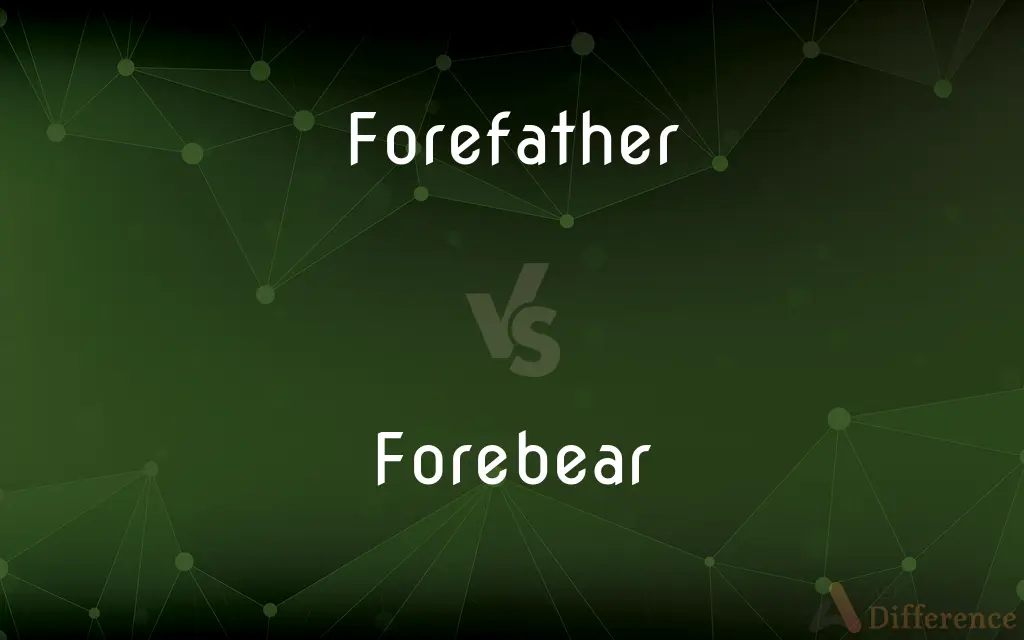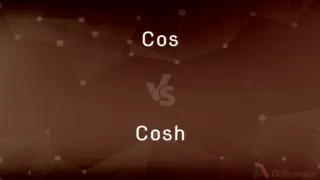Forefather vs. Forebear — What's the Difference?
By Tayyaba Rehman & Urooj Arif — Updated on April 5, 2024
Forefather typically refers to male ancestors, especially early ones in a family's lineage, while forebear is a gender-neutral term for any direct ancestor.

Difference Between Forefather and Forebear
Table of Contents
ADVERTISEMENT
Key Differences
Forefather is commonly used to denote male ancestors, particularly those from the distant past or significant figures in a family's or nation's history. It emphasizes a paternal lineage and often connotes respect for those who came before and laid the foundations of present circumstances. In contrast, forebear is a more inclusive term that refers to any direct ancestors, regardless of gender. It is used to acknowledge both male and female predecessors who have contributed to one's lineage.
The term forefather is frequently employed in discussions about historical figures and founders of nations, ideologies, or movements. It highlights the impact of these individuals on the course of history or the development of societal norms and structures. On the other hand, forebear is often used in genealogical contexts to refer to one's ancestors without specifying their roles or significance, focusing instead on the biological or familial connection.
Forefather can carry a connotation of reverence and respect, particularly when used to refer to the founding fathers of a country or pioneers of a particular field. This usage underscores the admiration for their achievements and contributions. Whereas, using forebear does not inherently convey a sense of reverence but rather a neutral acknowledgment of ancestry.
In cultural and societal narratives, forefathers are often mentioned as part of a legacy that influences current values, traditions, and beliefs. This term may be used to evoke a sense of pride and continuity. Conversely, forebears might be referenced in a more personal or familial sense, highlighting the connection to one's own past and the broader human experience of descent and heritage.
Despite their differences, both terms serve to connect the present with the past, emphasizing the importance of ancestors in shaping individual and collective identities. They remind us of our roots, where we come from, and in many cases, the principles and struggles that have contributed to our current way of life.
ADVERTISEMENT
Comparison Chart
Definition
Refers to male ancestors, especially significant ones.
A gender-neutral term for any direct ancestor.
Connotation
Often carries a sense of reverence and respect.
Neutral, focusing on ancestral connection.
Common Usage
Historical figures, founders of nations, movements.
Genealogical contexts, personal or familial ancestry.
Implication
Emphasis on paternal lineage and foundational figures.
Inclusive of both male and female ancestors.
Cultural Role
Invokes pride, legacy, and tradition.
Highlights connection to one's past and heritage.
Compare with Definitions
Forefather
A male ancestor, especially one who has significantly influenced one's lineage or community.
The village honors its forefathers with a yearly celebration.
Forebear
A predecessor in a non-familial context, such as a profession or ideology.
She studies the works of her intellectual forebears to gain insight into her field.
Forefather
An early ancestor who contributed to the foundation of a society or nation.
The forefathers of this nation fought for independence.
Forebear
Any direct ancestor, male or female, especially from the distant past.
Her forebears migrated to this country over two centuries ago.
Forefather
Historical figures from whom one is descended, often celebrated for their achievements.
Our forefathers endured many hardships to give us a better life.
Forebear
Ancestor or precursor in a family line.
The family estate has been passed down from forebear to forebear.
Forefather
A predecessor in a particular field or discipline, regarded with respect.
Many regard him as a forefather of jazz music.
Forebear
A person from whom one is descended, without implication of gender.
Tracing our forebears gives us a sense of identity and belonging.
Forefather
A founding member or patriarch of a family, group, or tradition.
He is considered a forefather of modern philosophy.
Forebear
One who precedes in lineage, contributing to one's genetic and cultural heritage.
Genetic testing has revealed fascinating stories about my forebears.
Forefather
Forefather is an English folk metal band from Surrey, England. There is a lack of consensus as to which of the "Anglo-Saxon Metal" or "Viking Metal" subgenre or subgenres of metal it belongs.
Forebear
An ancestor
Generations of his forebears had lived in London
Forefather
An ancestor.
Forebear
A person from whom one is descended; an ancestor.
Forefather
A person who is from an earlier time and has originated or contributed to a common tradition shared by a particular group.
Forebear
An ancestor.
Forefather
Ancestor
Forebear
Obsolete spelling of forbear
Forefather
Cultural ancestor; one who originated an idea or tradition.
Forebear
An ancestor. See Forbear.
Forefather
One who precedes another in the line of genealogy in any degree, but usually in a remote degree; an ancestor.
Respecting your forefathers, you would have been taught to respect yourselves.
Forebear
A person from whom you are descended
Forefather
The founder of a family;
Keep the faith of our forefathers
Forefather
Person from an earlier time who contributed to the tradition shared by some group;
Our forefathers brought forth a great nation
Common Curiosities
Why is it important to know about our forefathers or forebears?
Knowing about our ancestors provides a sense of identity, connects us to our cultural heritage, and helps us understand our place in history.
Is there a specific term for female ancestors similar to forefathers?
There isn't a direct female equivalent as commonly used as forefather, but terms like "ancestress" or "foremother" might be used in specific contexts.
What is the main difference between a forefather and a forebear?
The main difference lies in their gender connotation; forefather is specifically male, while forebear is gender-neutral.
Are all ancestors considered forebears?
Yes, all direct ancestors can be considered forebears, regardless of their gender or historical significance.
How do cultural narratives influence our perception of forefathers?
Cultural narratives often glorify or emphasize the achievements and struggles of forefathers, shaping national identity and values.
Can the term forefather be used for recent ancestors?
While it can be, forefather is typically used to refer to more distant ancestors or significant historical figures.
How can one trace their forebears?
Tracing one’s forebears can be done through genealogical research, DNA testing, and exploring historical records and family documents.
Do forefathers have to be blood relatives?
Forefathers are typically blood relatives, but the term can also be used more broadly to refer to founding or influential figures in non-familial contexts.
Can adopting cultural practices of our forebears affect our modern life?
Yes, adopting the cultural practices of our forebears can enrich our lives, connect us with our heritage, and provide a sense of continuity.
What role do forebears play in shaping family traditions?
Forebears are foundational to family traditions, as many practices, values, and stories are passed down from generation to generation, influenced by their lives and choices.
Share Your Discovery

Previous Comparison
Cos vs. Cosh
Next Comparison
Shake vs. ShiverAuthor Spotlight
Written by
Tayyaba RehmanTayyaba Rehman is a distinguished writer, currently serving as a primary contributor to askdifference.com. As a researcher in semantics and etymology, Tayyaba's passion for the complexity of languages and their distinctions has found a perfect home on the platform. Tayyaba delves into the intricacies of language, distinguishing between commonly confused words and phrases, thereby providing clarity for readers worldwide.
Co-written by
Urooj ArifUrooj is a skilled content writer at Ask Difference, known for her exceptional ability to simplify complex topics into engaging and informative content. With a passion for research and a flair for clear, concise writing, she consistently delivers articles that resonate with our diverse audience.
















































